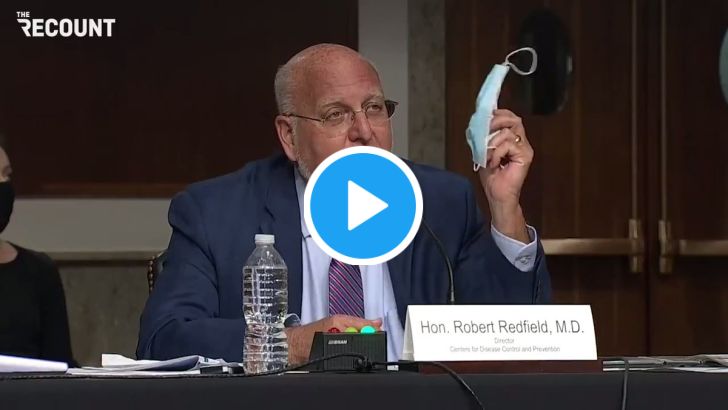https://jordanschachtel.substack.com/p/cdc-85-of-covid-19-patients-report
CDC: 85% of COVID-19 patients report ‘always’ or ‘often’ wearing a mask
Americans are wearing masks, but masks aren’t working.
|
|
An underreported, recently-published CDC study adds to the pile of evidence that cloth masks or other forms of mandated face coverings only contribute negatives to our COVID-19 problem. The study also displays — despite the constant accusations of widespread misbehavior from public health officials — that Americans are adhering to mask wearing, but mask wearing is not doing us any good.
The CDC study, which surveyed symptomatic COVID-19 patients, has found that 70.6% of respondents reported “always” wearing a mask, while an additional 14.4% say they “often” wear a mask. That means a whopping 85% of infected COVID-19 patients reported habitual mask wearing. Only 3.9% of those infected said they “never” wear a face covering.
The study offers insight into the reality that tens of thousands of Americans are acquiring COVID-19 on a daily basis despite overwhelming adherence to mask wearing. Masks simply aren’t working to “slow the spread” or “stop the spread.” The study also dismisses “public health experts’” claims from individuals such as Dr. Anthony Fauci and others that Americans are not following the guidance being disseminated by the CDC and other disease control agencies.
Americans are following the CDC guidance. It’s just not working.
As you can see in the screenshot below, the symptomatic group (left) mirrors the control group (right). The study fails to provide any evidence that COVID-19 infection protection is associated with mask wearing. In fact, given the lack of separation between the symptomatic group and the control group, it provides evidence that masks do absolutely nothing to stop the spread of COVID-19.
 The study directly contradicts mask assertions advanced by CDC director Robert Redfield, who claimed in a recent hearing that a cloth mask is “more guaranteed to protect me against COVID than when I take a COVID vaccine.”
The study directly contradicts mask assertions advanced by CDC director Robert Redfield, who claimed in a recent hearing that a cloth mask is “more guaranteed to protect me against COVID than when I take a COVID vaccine.”
The CDC study has been cherry picked by the COVID panic class to attempt to further shut down society.

Eating and drinking on-site at bars and restaurants increase the risk of contracting #COVID19 #Staysafe cdc.gov/mmwr/volumes/6…via @CDCgov
The study highlights the reality that people who go out more tend to increase their risk of acquiring COVID-19 (or any other contagious illness). This is common sense, and it is the reality of a society that involves interacting with other human beings. Sure, the “safest” way to shield yourself from a virus with a 99.8% recovery rate is to never interact with anyone ever again, but that’s preposterous as a long term standard of living. And still, the vast majority of novel coronavirus transmission occurs in the home.
There is no evidence anywhere in the world that masks are related to slowing or stopping COVID-19 transmission. Moreover, there’s plenty of evidence that universal mask wearing or mask mandates contribute countless negatives to society. Here’s but a few examples from cognitive scientist Mark Changizi:

Mark Changizi @MarkChangizi
2/ FISH OUT OF WATER “Sure, they reduce the rate of air flow, but airflow schmairflow!” Mandatory rules to cover your breathing entryways should be treated with skepticism. Breathing, and the rate at which it can occur, are fairly central to living.

Mark Changizi @MarkChangizi
10/ SMOTHER The folks who don’t like face masks enough to avoid such occupations have a variety of reasons for this, including ~ can’t psychologically handle a face mask, feeling smothered ~ panic attacks, & can’t wear it without severe distress ~ out of breath more easily

Mark Changizi @MarkChangizi
0/ <thread> Masks prevent wearers from seeing down, a view that includes their own bodies and floor in the periphery. Accordingly, face masks raise the risk of physical injury from falls etc. Among many other risks, these injuries must be factored in.
| 9 | 152 |





None of this is surprising in any way. At least 17 randomized controlled trials of mask usage have been conducted in the last 20 years and these studies have failed to show that masks will prevent infection in the general population. There are very few studies on the negative impacts of wearing masks, which is unfortunate, since some of the randomized controlled trials had more negative outcomes for the mask wearing groups than the controls.
For God’s sake can we please stop with the “masks don’t work crap”! Of course they work. Are they perfect? No. Better than nothing? Yes! If you think coughing or sneezing into you sleeve is a good idea then the mask is a good idea too. Use your logic please.
If you get the disease it is probably from your HANDS touching your face. Damn you people are stupid and believe anything to justify being a baby and not wearing a mask. I’m so tired of this crap. Use common sense people.